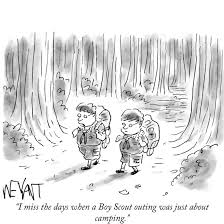It was a moment before the boy replied.
過了一會兒,男孩才回答。
Could the camper be making fun of him?
露營者會取笑他嗎?
Then, looking Mr.Grayson squarely in the face, he answered:
然后,他直視著格雷森先生的臉,回答道:
“Well, if you really want to know, sir, it’s like this:
“如果你真想知道的話,先生,是這樣的:”
“First find a place away from a tree, a stump, or a log, and not near any underbrush or young trees.
首先,找一個遠離樹木、樹樁或圓木的地方,不要靠近灌木叢或幼樹。
“Then scrape away all the pine needles, the leaves, the grass, sticks—everything that will burn—even the partly rotted stuff—until you get down to the dirt where it will not burn at all.
“然后刮掉所有的松針、樹葉、草、樹枝——所有會燃燒的東西——甚至是部分腐爛的東西——直到根本不會燃燒的地方。”

“Make a cleared space about five or six feet across; then build a small fire, just big enough for cooking.
“留出大約五六英尺寬的空地;然后生一個小火,剛好夠做飯用。
“When you leave the fire, put it out with water, sand, or dirt.
當你離開火的時候,用水、沙子或泥土把火撲滅。
“Be sure to cover the fire with enough sand or dirt free from sticks or leaves, so that it will not get air enough to burn.
“一定要用足夠的沙子或沒有樹枝或樹葉的泥土覆蓋火堆,這樣就不會有足夠的空氣來燃燒。”
“Play safe by taking one last look at your fire to see that it is completely smothered.
“為了安全起見,最后看一眼你的火,看看它是否完全被撲滅了。”
Otherwise it will just hold over, and maybe a little later the wind will blow some of the dirt away from it.
否則它就會保持不動,也許過一會兒風就會把一些泥土吹走。
The burning coals may burst into flame and set fire to the leaves and pine needles that might be blown across the fire by the wind.”
燃燒的煤炭可能會燃燒起來,點燃被風吹過火堆的樹葉和松針。”
When the Scout finished what he had to say about campfires, Mr.Grayson thanked him and then started off to find a safer place for his campfire.
當偵察員說完他對營火的看法后,格雷森先生向他道了謝,然后動身去找一個更安全的地方放營火。











